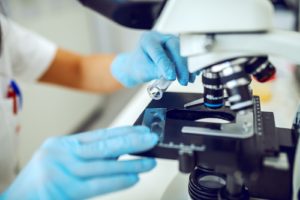 Experts maintain that the cause of autism is largely genetic; they attribute about 80% of the risk to inherited genes, leaving only 20% to environmental factors. This is a monumental finding for the causation and treatment for autism spectrum disorder (ASD). However, much is left to be discovered.
Experts maintain that the cause of autism is largely genetic; they attribute about 80% of the risk to inherited genes, leaving only 20% to environmental factors. This is a monumental finding for the causation and treatment for autism spectrum disorder (ASD). However, much is left to be discovered.
No single gene causes autism, and more than 100 genes have clear ties to the disorder. Because of this, there are no genetic tests available to diagnose autism. Many different changes and mutations in a person’s genes can lead to them developing autism. However, a genetic test can explain why your child developed ASD, as well as other information that could benefit your family.
If your child has ASD, our therapists and behavior specialists at BlueSprig will help them develop and strengthen their social, emotional, and intellectual skills to improve their quality of life.
We are involved in the scientific community and follow the latest research involving genetics and the role they play in autism. Our approach at BlueSprig is to use evidence-based autism treatment that will help your child live a satisfying and well-rounded life.
What Genetic Testing May Tell You
Genetic testing cannot tell you anything definitive about autism at this point. It may be able to tell you about some other genetic conditions, should you be concerned. One of these tests may inform you of:
- The chances that your future children may develop autism.
- What kinds of services and treatment may best benefit your child.
- Other health issues or concerns related to the genetic mutation that caused your child’s autism. Some genetic disorders have been associated with autism. These include tuberous sclerosis, benign tumors that grow on the brain and other organs, and Fragile X syndrome, a condition that causes intellectual disabilities.
If my older child has ASD, what are the chances any other children would have autism?
Parents may take genetic tests to determine if they passed on defective genes that led to their child developing autism. Research conducted at Duke University Medical Center found that this happens through a process called “genetic imprinting.”
Genetic imprinting goes against the typical laws of Mendelian genetics, which posits that genes are either recessive or dominant. In genetic imprinting, genes become “turned off” shortly after fertilization, or during the development of egg or sperm cells.
Imprinting affects a gene’s development. Through testing, genetic specialists can trace the pattern of inheritance of a disorder between parent and child.
Is genetic testing for autism reliable?
The short version is: not always. Genetic testing cannot diagnose or detect autism, as scientists can link over 100 genes to autism. Even so, no single instance is repeatable among those who have it. What testing can do is help identify markers or concerns, and it can help to advance broader autism research. These markers, when identified between siblings or parent and child, can help future researchers know what to look for and can help concerned caregivers have an explanation of the condition, but not a direct cause.
On a positive note, genetic testing is evolving and changing rapidly. In the future, we may discover a solid connection between genetics and DNA. For now, we only know that the connection exists.
Treatment for Your Child With Autism
At BlueSprig, our therapists and behavior technicians follow the most up-to-date practices extensively researched and backed by leaders in the scientific community. After your child has an autism spectrum disorder, come to BlueSprig for individualized treatment. We provide family training and support as well as comprehensive Applied Behavior Analysis (ABA) treatment for children, adolescents, and adults.
